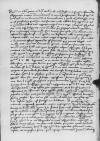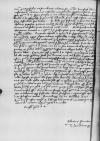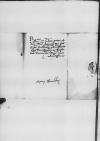Ea est Reverendissimae Dominationis Vestrae in me humanitas et benevolentia (quod cum alias saepe, tum ex iis praesertim, quas hic eius servitor mihi reddidit, ⌊⌋ cognovi), ut in curandis communibus nostris negotiis nusquam me a tergo relinquat, sed plus etiam curae atque diligentiae meis commodis quam propriis videatur impendere, sive in ⌊principum nostrorum⌋ aula, sive ⌊Romae⌋, sive apud nummularios intercessores res agenda est, nam quod a me desiderari ulla in parte possit, reliquit nihil, me vero indies magis magisque demeretur. Iam nobis a Romanis officiis exspectanda est serenitas, quae paucis contigit, nec multo ante ciconias adventura opinor, modo pro serenitate non veniant inanes bullae, toto auro tempestate aliqua absumpto, sed de procuratoris nostri diligentia non parum fido.
Narravi ⌊dominis confratribus⌋, quae mihi Reverendissima Dominatio Vestra scripsit de instituta profectione sua ⌊Helsbergum⌋. Hi iam ante mihi iniunxerant ac nunc commiserunt, ut suo nomine rogarem Reverendissimam Dominationem Vestram, dignaretur in eo itinere divertere in castrum capitulare ⌊Allenstein⌋ ac invisere locum, in quo ipsa non hospitem aget, sed ditionis socium. Mandatum est domino ⌊Achatio⌋, ut Reverendissimam Dominationem Vestram cum omni comitatu reverenter excipiat et pro modulo facultatis nostrae honeste lauteque habeat. ⌊Cui⌋ non omittat Reverendissima Dominatio Vestra scribere, quid ea in re constituat et in quem diem illuc sit, utinam feliciter, ingressura. Faciet in hoc Reverendissima Dominatio Vestra rem ⌊venerabili capitulo⌋ gratissimam et sua humanitate dignam. Cras dominus ⌊cantor⌋ hinc ⌊Heilsbergum⌋ revertetur, resignaturus Reverendissimae Dominationi Vestrae omnem administrationem eamque capitulari nomine excepturus.
Mos hic est hactenus observatus, ut confirmatum episcopum oppida epicsopalia ingredientem magistratus et populus cum clero ante portas excipiant, ac in templum assectato homagium statim praestent. Hoc ius an sibi nondum ab ecclesia sua translatae Reverendissima Dominatio Vestra deferri velit, est fortasse, cur deliberet. Id, qualecumque erit, intimari magistratibus oportebit, nequa impingant.
Quod de administratione bonorum ⌊Culmensis ecclesiae⌋ Reverendissima Dominatio Vestra statuit, satis mihi probatur. Nam, quod ego de mittendo a capitulo administratore scripsi, non alia re adductus feci, quam quod olim a me Reverendissima Dominatio Vestra exegerat, ut se migrante adesset ex meis quispiam, qui et relicta omnia conscriberet et moderandis omnibus praeficeretur. Iam, si Reverendissima Dominatio Vestra non dedignabitur eam curam absens obire, conquiesco in fide et amore illius, nec aliter mihi videbor, quam intra meas, ut dicitur, praesepes commorari. Verum id rogo, Reverendissima Dominatio Vestra expendat, plurimum mea referre, ut tempestive sciam, quid equorum, iumentorum, pecorum aliarumque rerum, quas postulat res familiaris, relictura sit, nam haec domesticam administrationem adituro aut noscenda, aut paranda opportune sunt. In quo Reverendissima Dominatio Vestra, spero, pro suo in me amore honestam mei habebit rationem. Deinde et de officialibus, si qui mihi conducendi sint, nosse referet, ne res sera difficultatem secum trahat.
⌊Ioannes Brede⌋ pro fasciculo, in quo erat breve apostolicum, poposcit quattuor aureos Rhenenses, quos illi ⌊frater meus⌋ solvit. Minoris constabit, puto, ⌊Cracoviam⌋ mitti omnia.
Mitto praesentibus articulos illos primo iuratos et a Reverendissima Dominatione Vestra subscriptos, quos non gravatim ⌊venerabile capitulum⌋ reddidit. Exspecto iampridem a Reverendissima Dominatione Vestra significationem aliquam de mandatis regiis super ratione instituendi ac colligendi accisam decretam, nam imitanda nobis erunt, quae subditis regiis praescribentur, ac id solum hactenus nobis exspectatur, caetera subditis sunt enuntiata, inter haec cup[iunt] ⌊domini fratres⌋ a Reverendissima Dominatione Vestra doceri, an domini in sua ditione ad eam pensionem pariter, ut subditi, debeant ex propriis brassaturis obligati haberi, nam anteh[ac] fuerunt liberi. Cupio etiam ipse a Reverendissima Dominatione Vestra discere, quandoquidem nobiles ab illa accisa Gedanenses facti sunt immunes, num etiam praelati et ceteri ecclesiastici, qui ex suis viventes possessionibus in ceteris habentur conform... nobilibus, eadem gaudeant emunitate, nam hi non minus nobilibus de hac Ged[a]nensium compilatione iustam habent querendi causam. Dignetur me Reverendissima Dominatio Vestra hac de re per oportunitatem facere certiorem, de accisa vero nostra quae ratio in[sti]tuenda sit, ut quamprimum sciamus, operepretium est.
Non possum pro [mea] fide et debito Reverendissimam Dominationem Vestram celare, idque in secretam aurem, dominum ⌊cantorem⌋ h[ic] cuidam dixisse, pensionem illam super ⌊episcopatu Varmiensi⌋, adhuc vivo domino ⌊Mauricio episcopo⌋, a ⌊sede apostolica⌋ reservatam sibi esse, ac expedita, quae ad hanc rem pertinent, quod ob multas causas non potui hactenus mihi persuadere, esse factum.
Mitto praesentibus, quae apud nos sunt nova, quorum auctor nos fugit, sed app[aret] Cracoviensem esse. Commendo me favori et gratiae Reverendissimae Dominationis Vestrae, cuius integritate et dilatione ego sustentor, utinam diutissime, cupiens ipsam Reverendissimam Dominationem Vestram felicissime valere.


